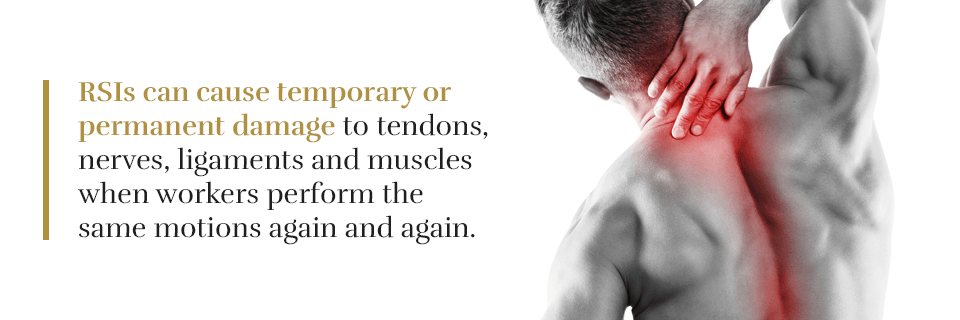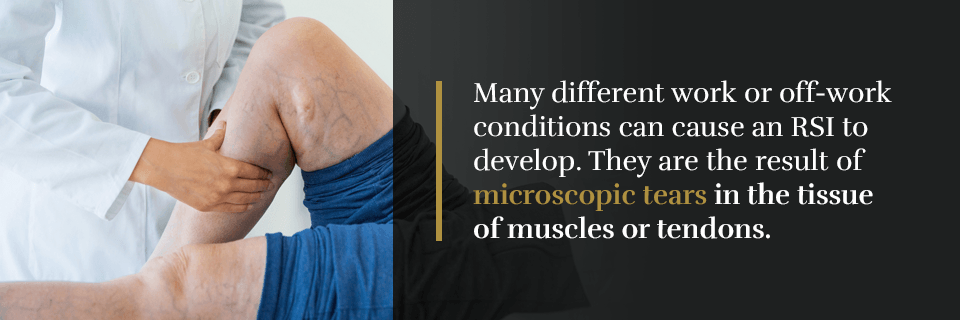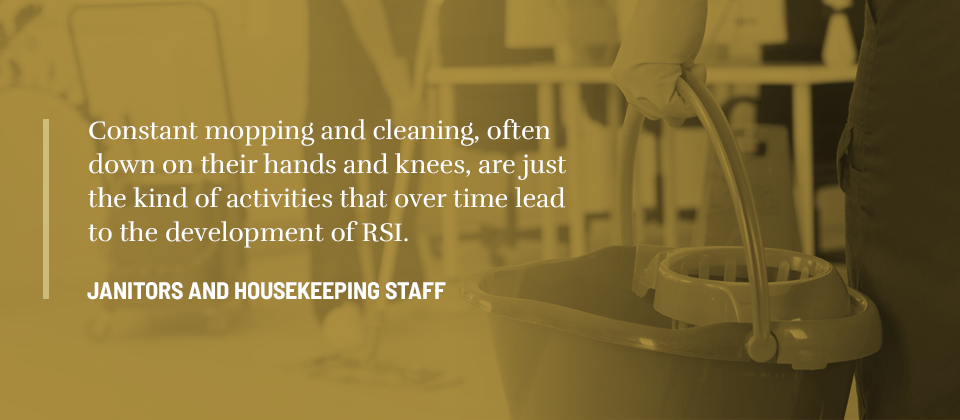A repetitive strain occurs when you perform the same motion over and over again, eventually resulting in a nagging pain in a muscle, nerve or tendon that becomes worse with continued overuse.
You may not realize it, but when you get a repetitive stress injury (RSI) as a result of a work-related activity, you may be eligible for workers’ compensation if the condition prevents you from doing your job. An increasing number of compensation claims today are RSI-related.
What Is RSI, and What Are the Symptoms?
Repetitive stress injuries are also called repetitive strain injuries, motion injuries, overuse injuries, cumulative trauma injuries, occupational overuse syndrome or regional musculoskeletal disorder. Although a traumatic event can be one cause of an RSI, in most cases, RSIs develop slowly, which means many injured workers ignore them until it’s too late.
RSIs can cause temporary or permanent damage to tendons, nerves, ligaments and muscles when workers perform the same motions again and again. Warning signs include pain or tenderness, stiffness, tingling or numbness, cramp, weakness and throbbing. RSIs usually affect the upper body, such as:
- Hands or wrists
- Shoulders and neck
- Forearms and elbows
- knees
- low back
Perhaps the best-known RSI is carpal tunnel syndrome. Carpal tunnel syndrome can happen to someone regardless of the kind of job they have. It occurs when the median nerve, which threads its way via a “tunnel” located in the wrist along the forearm to the hand, becomes compressed as a result of ligaments and tendons being swollen or inflamed. It is common among adults who work at computer keyboards or who perform the same task repeatedly on an assembly line.
Women develop carpal tunnel syndrome about three times as often as men do. It is also common in people who have a smaller “tunnel” panel in their wrists. You can develop carpal tunnel as a result of a trauma or injury, rheumatoid arthritis, thyroid disease or diabetes. Even pregnancy can make carpal tunnel worse.
Tendinitis is another common RSI. Tendons connected to bones can get injured by overuse. Tennis elbow and trigger finger —also known as Blackberry thumb, iPod finger, PlayStation thumb or Rubik’s wrist — are two of the more common injuries associated with tendinitis. Bursitis is a third form of an RSI.
Common Causes of an RSI
Repetitive stress injuries have been around for a long time. The first recorded case was in the 1700s, when an Italian physician described over 20 different kinds of RSI he noticed in industrial workers.
Many different work or off-work conditions can cause an RSI to develop. They are the result of microscopic tears in the tissue of muscles or tendons. When the body does not get enough time to repair the tears, they accumulate and swelling and pain develop.
Repetitive motion is the common factor in all RSIs. Doing the same job over and over does not give these small muscle tears time to heal. Daily computer use without adequate workplace protections, such as a chair that promotes proper posture, is one example. An RSI can also result from vibrations from using power tools or a jackhammer every day. People who work outside in the winter can be more susceptible to an RSI because of prolonged exposure to the cold.
Other common causes of work injury and repetitive strain include:
- Remaining in the same position for extended periods
- Staying in an awkward pose for a long time, such as standing with your arms over your head
- Frequent technology use
- Workspaces that are not ergonomically designed
- Fatigue
- Moving heavy loads
- Increased stress
- Repeatedly swiping items at a store’s checkout lane
- Too much golfing, swimming or any other sports activity, especially racket sports
- Assembly line work
- Having to constantly grasp or turn a tool such as a screwdriver
- Playing a musical instrument
- Scrubbing counters or toilets or mopping floors
What Are the Symptoms of a Repetitive Strain Injury?
It’s most common for repetitive use injuries to occur in the wrists and hands. Still, you may be uncertain whether the pain you experience results from RSIs in the workplace or something else. Repetitive stress injury symptoms include:
- Tingling
- Burning
- Numbing
- Aching
- Pain
- Throbbing
- Cramping
- Tenderness
- Loss of sensation
- Muscle weakness
You may feel other similar symptoms in different parts of your body. If possible, take a break from the repetitive motion for a day or two to help determine if these symptoms result from repetitive strain injury at work. If the symptoms go away, but return once you go back to performing the task in question, chances are good you have an RSI, and you should see a doctor. They can help determine how to treat the injury and give you an estimate of how long RSI takes to heal.
Industries Where Repetitive Stress Injuries Are Common
As we learned above, doctors as far back as the 18th century were noticing RSI symptoms in a variety of occupations, including those who milked cows by hand. These days, it’s not just jobs where you need to repeatedly lift heavy objects or constantly use tools that can create RSIs. According to the Occupational Safety and Health Administration, 1.8 million workers develop an RSI every year. Technology, which helps us do our jobs so much more easily, also means we are more at risk of RSIs because of the repeated motions needed to use many technological tools.
1. Office Workers
There are many places where we can witness the result of technology and how it can cause RSIs, but it may be most obvious among office workers, especially people who work with computers. In the past, no doubt, women who worked as secretaries on typewriters probably developed RSIs. During World War I, Morse code operators were known to develop “glass arm.” With the advent of computers, however, and the number of people who use them for things other than administrative tasks, the corresponding rise in the number of RSIs has been noticeable.
Anyone who works for long periods with computer keyboards is susceptible to RSIs. In the office environment, several causes lead to developing RSIs:
- An inadequate layout of the workspace
- Office equipment that is old and ill-suited for modern tasks
- Keyboard setup
- Position of the mouse
2. Trade Jobs
Anyone who works in a trade job — such as an electrician, a construction worker or a plumber — knows the work often requires repeating the same task over a prolonged period. Not only that, but electricians and plumbers in particular often need to stand or squat in awkward positions for hours to fix an electrical or a plumbing problem. Think of the popular image of the plumber hunched under the kitchen sink. Plumbers and electricians often need to grasp tools tightly to loosen valves or remove screws. It’s easy to see how an RSI can develop in people who do this again and again for hours on end.
Meanwhile, we’ve already talked a little bit about the dangers that face construction workers. Repeatedly lifting heavy loads, working in cold temperatures and sometimes repeating the same task for an extended period are all factors that make developing an RSI more prevalent. These RSIs often affect backs, legs, knees, arms or hands.
3. Medical Workers
The health care profession has a reputation for long hours and stressful situations. Nurses or nursing assistants must often lift patients in or out of a bed or a wheelchair. As the population ages, and as more Americans fall victim to the obesity epidemic, this task has become increasingly challenging, and it is much easier to develop an RSI.
The same is also true of those who work in physical therapy. Therapists frequently need to lift or move patients to help them heal from injury. This kind of daily repetitive strain on the back and the legs is the perfect formula to develop an RSI.
Stress is also a factor that can contribute to an RSI, and there is no shortage of that in the health care field. For example, a recent study by the American Nursing Association found 60 percent of nurses said there is a great deal of stress associated with their job.
Here is another area where technology both helps and hinders the profession. It’s common now to see a doctor or a nurse enter a waiting room holding a computer. The computerization of patient records has led to far fewer mistakes, and it’s much easier for a doctor or nurse practitioner to send a prescription to a pharmacy. The constant use of computers also means these medical professionals are susceptible to carpal tunnel syndrome.
4. Grocery and Stock Clerks
Scanner technology allows us to move through a checkout line at our local grocery store more quickly and efficiently. But for a grocery clerk whose job requires them to swipe item after item for hours at a time, it’s easy to see how conditions like carpal tunnel, tendinitis or bursitis could develop.
The same is true for stock clerks. This job often requires for them to work in awkward positions for hours, frequently with their arms over their heads, to reach the shelves with the items they need to restock. Or, they need to squat or kneel to stock lower shelves. It’s not the stocking of the shelf that’s the problem. It is the fact that they must do it, again and again, day in and day out, that leads to the development of RSI.
5. Janitors and Housekeeping Staff
Constant mopping and cleaning, often down on their hands and knees, are just the kind of activities that over time lead to the development of RSI. The janitor who mops the floors in your building or at your child’s school uses their wrists and arms all day. The same is true of the housekeeping staff at a hotel, who must make dozens of beds and scrub sinks, tubs and toilets daily.
These are just several of the more common occupations where there is a real danger of developing an RSI. Other jobs include:
- Bus drivers
- Pipefitters
- Firefighters
- Agricultural workers
- People who work processing and cutting meat, whether in a deli or in an industrial plant
- Delivery workers
- Professional athletes
- Musicians
- Transportation workers
- Postal workers
- Hairdressers
- Welders
- People who work in food processing, such as cake decorators or fishmongers
- Bricklayers and carpenters
What to Do If You Think You Have a Repetitive Stress Injury
If you work in one of the jobs mentioned above, and your RSI has become severe enough that it has forced you to miss time, there are several essential steps you must take before you can apply for repetitive motion injury workers’ compensation.
1. Document the Injury
If you suspect you have developed an RSI, it’s a good idea to document the conditions on your job that you think may have led to the injury. Keep a record of the hours you’ve worked on a particular task, when you started to feel the pain and how the pain progressed. If you stopped doing this task for a couple of days and the pain went away, but then returned when you return to your job, note that as well.
In any workers’ compensation case, documentation is crucial. Medical evidence, especially from your doctor, is paramount. However, the notes you take yourself about the amount of pain you’re experiencing, as well as the observations of your family or your co-workers about how the injury is preventing you from doing your job or enjoying your life, can be just as important.
2. Speak to Your Employer
Under Pennsylvania law, there are time limits on when you must report an injury to your employer if you hope to receive RSI workers’ compensation. When a worker has suffered a catastrophic injury or harm sustained during a fall or by a piece of equipment falling on them, the injury is much more evident. A worker should report an injury immediately. If a doctor tells you that your medical condition is from work activity, you should report that to your employer as soon as you know. A worker has no longer than 120 days after a work-related injury has occurred to report it to their supervisor or to their employer.
Reporting is somewhat trickier with a repetitive strain injury. RSIs rarely develop all at once, so it’s more challenging to nail down the date when you think the injury occurred. Here is where your doctor comes into play. Once you start to feel pain consistently, visit the doctor immediately. The moment the doctor diagnoses you with a repetitive strain injury is when the 120-day notice period begins. You should never wait this long, however, to report a repetitive strain injury to your employer. Do so as soon your doctor lets you know. If you wait until the end of 120 days, your employer could argue your RSI must not have been that bad, and therefore you don’t deserve repetitive motion workers’ compensation.
3. Go to the Doctor
If you believe you have developed a repetitive strain injury, your first move should be to call a doctor. That’s not only because the doctor can provide you with information on how you can reduce or heal your repetitive strain injury, but if you’re going to file a workers’ compensation claim, you’re going to need plenty of reliable, credible documentation to back it up.
In Pennsylvania, however, after you have notified your employer of your injury, the law requires you to select a doctor for the first 90 days from an employer-provided panel list, so long as you were provided with a written panel list of physicians when hired and after your injury . It is vital to make all the necessary visits. After 90 days, you can switch to whichever doctor you prefer, but until that 90-day period is up, make sure you attend every required appointment with the employer-required doctor.
This stage is also where the documentation process begins. Even when you’re visiting the employer-required physician, you are starting to compile a record about your repetitive stress injury. Make sure you take lots of notes and keep all bills or medical information the doctor gives you. If the doctor suggests you need to see a hand specialist for carpal tunnel syndrome, make sure you keep all the documentation from those visits. That’s because the next person you’re going to see will need all the documentation to help ensure you receive repetitive strain injury workers’ compensation to which you are entitled.
4. Speak to a Lawyer
If your doctor has diagnosed you with a repetitive stress injury as a result of a work-related activity, you should contact an experienced repetitive strain injury compensation lawyer as soon as possible. Employers sometimes hesitate to pay repetitive strain injury claims for injuries, such as those caused by a slip or a fall or a falling piece of equipment. A repetitive strain injury workers compensation case can be even more challenging to prove. Though the intent of establishing the workers’ compensation system was to benefit both the employer and the employee, many companies are reluctant to pay for injuries their employees receive on the job.
When you work with an experienced workers’ compensation lawyer, however, they can help ensure your employer or their insurance company don’t cheat you out of the compensation you need to support yourself and your family, or for the medical treatment you need to heal.
Can I Use Workers’ Compensation for RSI Injuries?
Absolutely. Workers’ compensation covers more than catastrophic injuries. Any injury you suffer as a result of a work-related activity makes you eligible for workers’ compensation if you can demonstrate work-related activity caused your injury. Under Pennsylvania law, workers’ compensation covers repetitive stress injuries, such as carpal tunnel syndrome.
You can earn repetitive strain injury workers’ compensation benefits if you suffer from a repetitive stress injury. Contact a workers’ compensation attorney to help you file a repetitive strain injury claim.
A repetitive strain injury can impact your life and your ability to work by inhibiting your ability to perform the daily tasks your employer expects of you, which is why you are eligible for workers’ compensation.
If You Have a Work-Related Repetitive Stress Injury, Contact Our Experienced Lawyers
Work-related repetitive strain injuries can sometimes be difficult to prove. You may feel frustrated by the pain you feel and unsure of how to provide for your family when you cannot work. Frommer D’Amico specializes in workers’ compensation cases. That’s the only thing we do. We’ve won millions of dollars in compensation for our clients. Our experienced attorneys can form a strategy that will get you the best possible outcome in your RSI claim.
Contact us today about your repetitive strain injury. We want to help you move forward. Give us a call at 717-428-7465 to schedule a free consultation. Or, visit our contact us page, where you can leave us your contact information and some details about your situation.










